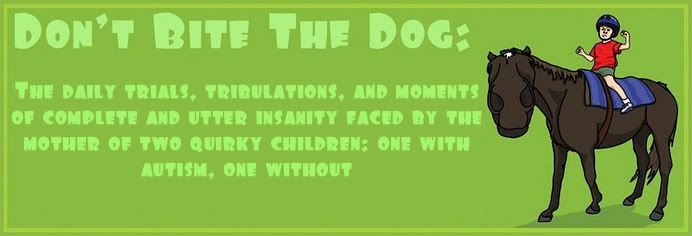I'm not going to go into specifics on what prompted this particular post, but I think it is a really good topic of discussion, and I would appreciate any opinions or personal experiences (lurkers, that means you!).
If your family is anything like mine, you have a child who goes to at least one therapy session per week. Some people, like ourselves, have three a week. Others have even more. Speech therapy, occupational, physical, ABA, TEACCH, and the list goes on and on. And if you moms are like me, you get used to a specific schedule, with a specific therapist. You get to know the therapist working with your child, and eventually you either click or you dont. When you do get that click, you end up with a relationship that is beneficial for a lot of reasons- The therapist teaches you how to do things at home, the therapist takes into account your own experience and knowledge of your child (which a lot of therapists do not do, until they realize that we moms ARE smart enough to take seriously, even if we don't have degrees), and it becomes possible to really create a "program" that all carries over from therapies, to school, to home.
Not only this, but you also develop a schedule that is very complicated. It's hard to arrange everything else (school, appointments, jobs, college) around a few therapy sessions. Plus,there is the issue of transportation, if you only have one vehicle. Luckily for us, there is a van service in NC that is paid for by insurance, but even that has to be painstakingly organized. It has taken us over a year to actually fit in nicely with the van service's schedule/ No more sitting around for hours, or wondering if we'd be picked up at all. Everything has been set, it's all in sync with everything else, and changing it would be a royal pain the the rear.
So my question, to you readers, whether you're moms, therapists, or both, is this: Who should decide a child is ready to be discharged from a particular type of therapy? Should the decision be one made solely by the therapist? Solely by the parent? A combination of the two? And when there is disagreement, what then?
There are a lot of reasons behind situations like the one I'm vaguely describing. Paperwork with certain insurance companies is a pain. I've heard from a couple of friends who work in fields where Medicaid billing is concerned, that they're discharging patients (mental health, so not quite the same thing) because the recent Medicaid changes require prior approval for EVERYTHING, and a whole lot of paperwork too. Personally, I think this is a BS excuse, I'm sorry, but these professionals make a whole lot more than the rest of us- that's part of the job. NOT saying this is the reasoning in every case, but it does seem to be in some cases.
I guess different facilities might have specific requirements as to what skills they can work on. If this is the case, then I can understand a therapist discharging due to lack of new skills to teach. But, in that case, it would be useful to know what the guidelines of the facility are prior to entering therapy, and also to get more than a month or two's notice. More on that in a second, back to my point. If a facility only allows therapists to work on certain types of skills, it all makes sense. But to just say there are no more skills to work on, with no other reason, really confuses me. What about writing skills? Or more fine motor skills. How about working on self help skills? With autistic kids like my son and his little blonde buddy, you never run out of things that need work. They don't get "perfect" and 100%.
Anyway, speculation on reasoning aside, if discharging a child must be done, I think there is a certain way to go about it. Notice is important, because I don't know a whole lot of moms with kids like Jaymes who are going to say "Oh, he's done with therapy? Ok!" Nah, the first thing any of us will do is get on a waiting list for another facility. Except those facilities have waiting lists 6 months long. And that's if you don't have a specific day/time that works. Good luck trying to find an opening for a therapy session on Tuesdays after 5pm. It takes months and months being AT a facility before you even get that coveted time slot.
As moms, we know how our kids will react to things like leaving therapy. We generally have at least a good idea of whether they'll regress and lose skills. So we start freaking out realizing that therapy is going to end soon, and there is not a SINGLE facility with an opening at a time that works. Cue the anxiety.
Anyway, don't mind me. I'm just rambling at this point. The question remains, though: Who gets to decide a child is "done" with a therapy? Because I'd really love to know.
Comment créer un aménagement paysager?
4 years ago







